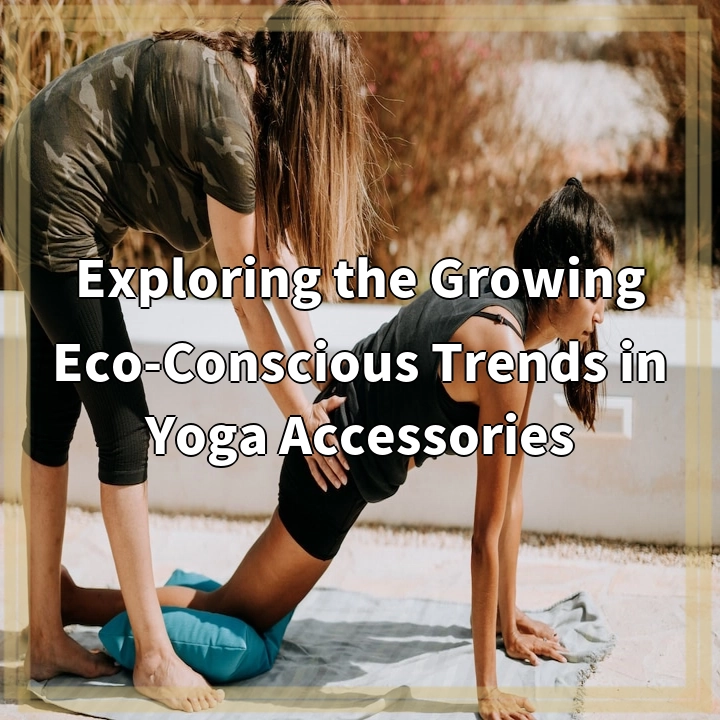
What it is:
Exploring the Growing Eco-Conscious Trends in Yoga Accessories
In recent years, there has been a notable shift towards eco-consciousness in the yoga community. As practitioners become more aware of the environmental impact of their choices, they are seeking out yoga accessories that align with their values of sustainability, ethical sourcing, and social responsibility. Eco-conscious yoga accessories are those that are made from eco-friendly materials, produced using ethical manufacturing practices, and support fair trade.
Real-World Problems:
This growing trend towards eco-consciousness in yoga accessories is driven by several real-world problems in the industry:
1. Plastic Pollution:
The production and disposal of non-sustainable yoga accessories often contribute to plastic pollution. Many traditional yoga mats, blocks, and straps are made from synthetic materials like PVC, which not only depletes non-renewable resources but also releases harmful chemicals during production and can take hundreds of years to decompose. As a result, these products end up in landfills, oceans, and ecosystems, damaging the environment and wildlife.
2. Worker Exploitation:
Another concern is the unethical practices associated with the manufacturing of yoga accessories. In some cases, workers are subjected to poor working conditions, unfair wages, and long hours in garment factories or production facilities. Exploitative labor practices not only violate human rights but also contribute to a cycle of poverty and inequality.
3. Deforestation and Habitat Destruction:
The extraction of materials for yoga accessories, such as rubber or cork, can contribute to deforestation and habitat destruction. Unsustainable sourcing practices can lead to the destruction of natural habitats, impacting biodiversity and disrupting ecosystem balance. Additionally, the chemicals used in the processing of these materials can have negative ecological impacts, such as water pollution and soil degradation.
4. Waste and Consumption:
The yoga community has witnessed a growing concern about excessive consumption and waste within the industry. With a wide variety of accessories available in the market, practitioners often feel the need to constantly purchase new products, leading to a culture of disposability. This constant turnover of items adds to the overall waste generated and further contributes to the environmental footprint.
By exploring the growing eco-conscious trends in yoga accessories, we can raise awareness about these real-world problems and encourage individuals and businesses to opt for more sustainable alternatives. The adoption of eco-friendly materials like natural rubber, organic cotton, and recycled materials, as well as the support of fair trade and ethical manufacturing, can lead to a positive transformation in the yoga accessories market, minimizing harm to the environment, workers, and communities.

Solutions to Eco-Conscious Trends in Yoga Accessories:
The growing eco-conscious trends in yoga accessories present opportunities for solutions to address the real-world problems outlined above:
1. Sustainable Materials:
One solution is to prioritize the use of sustainable materials in the production of yoga accessories. Natural rubber, organic cotton, and recycled materials are environmentally friendly options that can replace synthetic materials like PVC. These materials are renewable, biodegradable, and have a lower ecological footprint.
2. Ethical Manufacturing:
Ensuring fair and ethical manufacturing practices is crucial for creating sustainable yoga accessories. Companies can prioritize partnerships with suppliers that provide fair wages, safe working conditions, and employee rights protection. Certifications like Fair Trade and GOTS (Global Organic Textile Standard) can help consumers identify products manufactured under ethical guidelines.
3. Conscious Consumption:
Encouraging conscious consumption within the yoga community is another solution. Practitioners can be encouraged to invest in high-quality, durable yoga accessories that have a longer lifespan. This reduces the need for constant replacements, minimizing waste and overall environmental impact.
4. Education and Awareness:
Education and awareness play a crucial role in driving eco-conscious trends in yoga accessories. Yoga studios and influencers can promote sustainable alternatives, explain the environmental impact of certain materials, and highlight the importance of ethical sourcing. By raising awareness, individuals can make informed choices and drive demand for eco-friendly products.
Embracing these solutions can help foster a more sustainable and ethical landscape for yoga accessories. By prioritizing sustainable materials, ethical manufacturing practices, conscious consumption, and education, we can create a more eco-conscious and responsible yoga community. Together, we can make a positive impact on the environment, workers, and communities affected by the production and use of yoga accessories.















